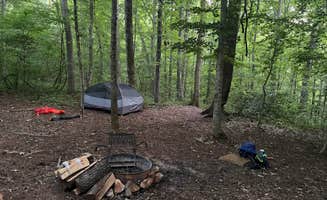Dispersed camping options near Walnut Cove, North Carolina provide budget-friendly alternatives for outdoor enthusiasts in the western Piedmont region. This area sits at elevations ranging from 800-1200 feet with a moderate climate that allows for camping throughout much of the year. Winter temperatures typically remain above freezing during daylight hours, though overnight temperatures can drop significantly between November and March.
What to do
Hiking trails access: Shallow Ford Natural Area connects to the Mountains to Sea Trail, offering extended backpacking opportunities for those seeking longer adventures. The trail system provides multiple access points for hikers who wish to break their journey with overnight camping.
Wildlife observation: Robbins Branch Trail features diverse wildlife habitat where campers regularly spot deer, wild turkeys, and various bird species. The secluded location minimizes light pollution, creating excellent conditions for stargazing on clear nights.
Fishing opportunities: Several dispersed camping areas provide access to local waterways where fishing is permitted with proper North Carolina licensing. Anglers should check seasonal regulations as catch limits and permitted species vary throughout the year.
What campers like
Natural setting: Visitors to Shallow Ford Natural Area appreciate the undisturbed environment. One camper noted, "There's lots of shade and it is very peaceful. It is pretty flat for your tent and there are fire rings."
Water proximity: Many dispersed camping areas near Walnut Cove offer sites within hearing distance of streams or rivers, providing both ambient sound and water access for filtering. Campers should bring appropriate water treatment equipment as no potable water is available.
Solitude factor: The limited accessibility of these camping areas naturally restricts visitor numbers, particularly on weekdays and during shoulder seasons. Weekends in summer may see increased traffic, but sites remain considerably less crowded than developed campgrounds.
What you should know
No facilities: Robbins Branch Trail and similar dispersed camping areas near Walnut Cove operate under strict pack-in, pack-out principles. No trash service, toilets, or potable water exists at these locations. Visitors must prepare accordingly with sufficient water containers and waste disposal plans.
Access considerations: Most free camping options require either hiking in or navigating unpaved roads that may become difficult or impassable during wet weather. Four-wheel drive vehicles are recommended for certain access points, especially after rainfall.
Fire regulations: While established fire rings exist at some locations, seasonal fire restrictions may apply, particularly during drought conditions or high fire danger periods. Campers should check current regulations before planning to have campfires.
Tips for camping with families
Safety planning: When camping with children at dispersed sites near Walnut Cove, bring detailed maps and establish clear boundaries. The lack of defined campsites means parents should identify natural markers to help younger campers understand where they may explore independently.
Wildlife awareness: Teach children proper food storage techniques to prevent unwanted animal encounters. All food items should be secured in animal-proof containers and never stored in tents.
Activity preparation: Without organized recreation facilities, families should pack lightweight games, field guides for nature exploration, and other entertainment options suitable for primitive camping environments.
Tips from RVers
Size limitations: Dispersed camping areas near Walnut Cove generally accommodate smaller RVs and camper vans rather than large motorhomes. Access roads often have limited clearance and turning radius restrictions that make navigation challenging for larger vehicles.
Leveling requirements: Free camping sites typically offer natural, unimproved parking areas. RVers should bring sufficient leveling blocks as terrain is rarely flat enough for comfortable camping without adjustments.
Resource management: With no hookups available, RV campers must carefully monitor water, propane, and battery usage. Plan trips according to your rig's capacity limitations and consider bringing portable solar panels for extended stays.


